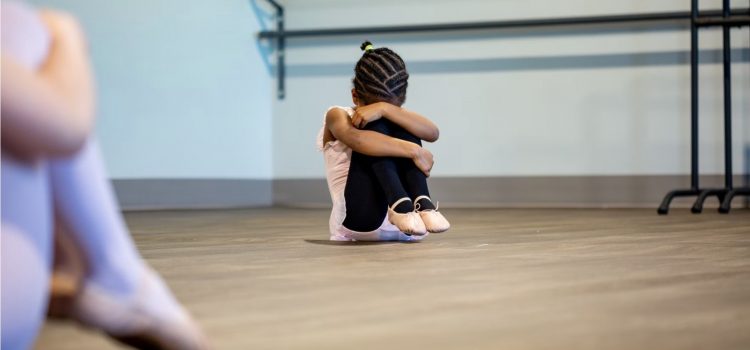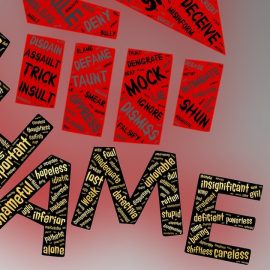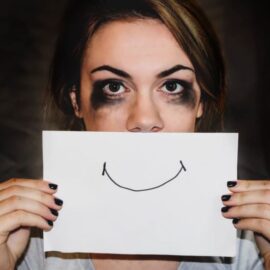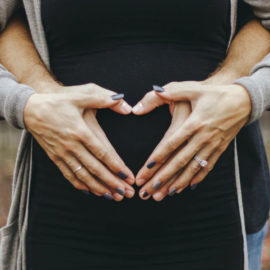
This is a free excerpt from one of Shortform’s Articles. We give you all the important information you need to know about current events and more.
Don't miss out on the whole story. Sign up for a free trial here .
Wondering what causes childhood anxiety? What sources of stress do today’s children face? What behavior should parents look out for?
More children are grappling with mental health issues due to factors like rising gun violence and pandemic stress, made worse by earlier puberty and 24/7 access to the internet. However, there is a lack of professional resources to identify and help children suffering from anxiety.
Read on for an overview of what causes childhood anxiety in today’s society and what the symptoms are.
The Mental Health Crisis & Childhood Anxiety
When trying to determine what causes childhood anxiety, it’s important to recognize that children today are being bombarded with worries that preceding generations didn’t face. The stressors range from daily fears like feeling unsafe due to rising gun violence to long-term concerns such as the climate change crisis, which gives them a bleak picture of their future. While anxiety disorders in children and teens have been on the rise for 15 years, the Covid-19 pandemic disruption exacerbated an already alarming situation. Research suggests there was at least a 20% increase in kids exhibiting depression and anxiety symptoms in the first year of the pandemic.
Left untreated, children with anxiety may struggle to perform in school and form healthy relationships, and they may also be more susceptible to depression and other mental disorders as well as substance abuse later in life. With the limited availability of child psychiatrists and many families’ inability to afford care, kids in the US are especially vulnerable—the mental health problem among young people is so severe that experts have declared it a national emergency.
Here, we’ll break down what causes childhood anxiety and how this anxiety is manifesting in their behavior.
What’s Causing Anxiety in Children?
It’s natural, even good, for kids to be exposed to the normal stress that comes from day-to-day challenges like a big exam or a fight with a friend. Overcoming such difficulties builds their resilience and gives them the skills they need to grow into independent adults. However, this generation may simply be dealing with too much—a unique combination of unrelenting stressors, unlimited internet access, and earlier puberty that has had a profound effect on their psychological well-being. We’ll explore each of these factors in turn.
Unrelenting Sources of Stress
There is plenty for kids to be anxious about these days. Among their many concerns are:
1) The Covid-19 pandemic. Research reveals a global spike in childhood anxiety and depression caused by the pandemic and its attendant lockdowns, which created social isolation affecting their development. Aside from having no peer interaction and missing out on milestone events like the first day of school and graduation, children may also have had to deal with the death of loved ones or parents’ job loss. Some data suggest an increase in cases of domestic child abuse as a consequence of being stuck at home.
Even with restrictions easing and in-person interactions resuming, the impact of the pandemic continues to reverberate. One study warns that mental health disorders may not fully surface until two to four years after a traumatic event.
2) Academic demands. Even before reaching high school, kids feel immense pressure to perform well academically and increase their chances of getting into good universities—one expert at Johns Hopkins Hospital noted that he’s seen eighth-grade patients who already felt pressured to choose a career. These kids’ schedules may be overloaded with advanced classes, tutoring for SATs, and extracurricular activities that would look good on their college applications.
3) Gun violence. With the incidence of mass shootings increasing, kids are living with a heightened and ever-present fear. Active shooter drills that are meant to prepare them for such situations may also be contributing to their psychological distress.
4) Racial injustice. An advisory from the US Surgeon General states that young people—particularly marginalized communities—have had to contend with concerns about racial issues, in the wake of Black Americans fatally shot by police officers and Asian Americans targeted for Covid-related hate crimes.
5) Climate change. Another cause of childhood anxiety, many young people suffer from eco-anxiety, which the American Psychological Association defines as “a chronic fear of environmental doom.” Worrying about the future of the planet and how this affects their future and that of their potential children can make kids feel frustrated and powerless.
Unlimited Internet Access
Kids are continuously exposed to these sources of stress due to their 24/7 access to the internet—in 2019, more than half of 11-year-olds in the US owned a smartphone, and teenagers spent over seven hours a day on their devices, excluding school-related screen time. Some experts suggest that social media can cause an increase in childhood anxiety: Scrolling through other people’s airbrushed posts can affect young people’s self-esteem and make them feel less satisfied. They may also agonize over posting the perfect photo, getting enough likes, and being cyberbullied.
Additionally, this hyperconnectivity may overwhelm their brains, which are extra sensitive to too much information during puberty. It may also disrupt their sleeping habits and make them less inclined to engage in physical activity, both of which have detrimental effects on mental health.
Earlier Puberty
Aside from worrying about what’s happening in the outside world, children also have to make sense of what’s happening to their own bodies. Researchers say that puberty arrives much earlier now—it used to start at age 16, but it now starts at 12; some girls hit the developmental milestone before the age of 8. The cause of early-onset puberty is unclear, but some experts attribute it to the rise in childhood obesity, environmental factors like chemicals in food packaging, and lifestyle factors like a lack of physical activity.
Those who undergo puberty earlier than their peers have a higher risk of developing mental health issues; at an age when they want to fit in, kids who go through changes that none of their friends are experiencing may feel confused and isolated. Girls are especially vulnerable to the destabilizing effects of their maturing bodies, which may attract unwanted sexual attention.
How Symptoms of Anxiety Show Up in Kids’ Behavior
Aside from what causes childhood anxiety, it’s also important to understand the symptoms children might display as a result of mental illness, including anxiety. Trying to process all these concerns can be overwhelming for young people. However, unlike adults, kids may not be able to verbalize what they’re feeling. Thus, they exhibit anxiety in other ways.
In the US, hundreds of school counselors note that kids have a hard time making friends and lack teamwork and conflict resolution skills, resulting in many more physical fights. (One counselor says she’s seen more fights in one year than in 15 years combined.) Elementary-age kids are more prone to big emotional outbursts over small things; they throw things, yell, and are generally less controlled—developmentally, they seem to remain stuck at their age when the pandemic began. Meanwhile, teenagers are disinterested in socializing or doing things they previously enjoyed, signals tricky to interpret because they’re hard to distinguish from normal teenage angst.
Across the board, anxious young people may refuse to go to school, have altered sleep patterns, feel tired all the time, exhibit obsessive-compulsive behaviors, and experience physical symptoms like headaches, stomach or chest pains, and shortness of breath. Most alarmingly, they may engage in self-harm—cutting, burning, or hitting themselves to distract them from emotional pain.
| If you’re concerned that your child may be having thoughts of suicide: – US residents: Call the Suicide and Crisis Lifeline at 988, dial 911, take them to the emergency room, or find additional resources here. – Outside the US: Find a list of resources here. |

Want to fast-track your learning? With Shortform, you’ll gain insights you won't find anywhere else .
Here's what you’ll get when you sign up for Shortform :
- Complicated ideas explained in simple and concise ways
- Smart analysis that connects what you’re reading to other key concepts
- Writing with zero fluff because we know how important your time is






